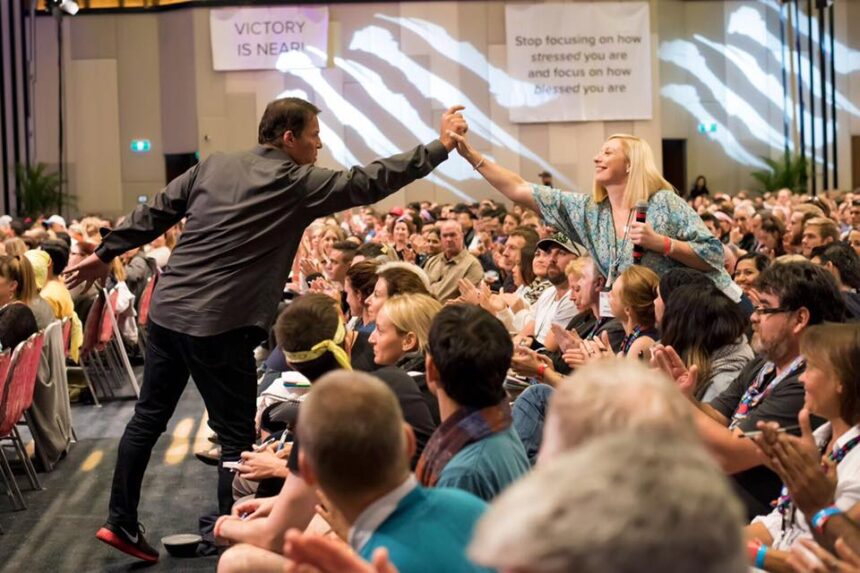An in-depth investigation into the tactics, promises, and realities of high-priced personal development events.
For decades, Tony Robbins has dominated the personal development industry, building a massive empire through his seminars—particularly his flagship “Unleash the Power Within” (UPW) events. These programs attract thousands of attendees willing to pay $3,000-$5,000 for what’s promised to be a life-changing experience. But across social media, forums, and review sites, a fundamental question is increasingly being asked: Are these expensive seminars genuinely transformative experiences that justify their hefty price tags, or elaborate scams designed to exploit vulnerable people seeking help?
A growing chorus of critics, former attendees, and industry watchdogs are raising serious concerns about what happens behind the motivational facade. Online communities frequently debate whether participants are receiving valuable tools for personal growth or simply falling victim to sophisticated emotional manipulation and aggressive upselling tactics.
This investigation draws from firsthand accounts, expert analysis, and industry insider perspectives to examine what really happens behind the scenes at these high-profile events, and whether they constitute legitimate personal development or something more problematic.
Inside a Tony Robbins Event: The Experience
Tony Robbins events are meticulously crafted experiences designed to create powerful emotional responses. Typically spanning 3-4 days, these seminars follow a carefully orchestrated format:
- Sensory overload environment: Events feature deafening music (many attendees report needing earplugs), constant physical movement, and crowd participation creating a concert-like atmosphere
- Extended sessions: Days often run 12-15 hours with minimal breaks for food or rest
- Emotional manipulation: Activities alternate between triggering deeply negative emotions and euphoric highs
- Public vulnerability: Participants are encouraged to share traumatic personal struggles in front of thousands
- Physical challenges: The famous “firewalk” (walking barefoot over hot coals) serves as a metaphor for overcoming fear
Former attendee Clément Bourcart described his experience at a London UPW event: “We were two of the 13,000 people attending the event, packed in a huge arena. The energy and buzz in the lead-up to it was quite something… Though there were some positive moments, the enthusiasm quickly vanished.”
This sentiment echoes across numerous attendee reports who describe an initial “high” that fades within days of returning home. As one Reddit commenter explained: “I went to his entry level event UPW when I was in college. Walked on coals, did the whole thing… I left inspired. It all went away pretty fast though… I’d compare it to a religious revival meeting, but for business.”
The Business Model: How The Machine Works
Understanding the Tony Robbins business model reveals a carefully engineered customer journey designed to maximize revenue extraction:
- Entry-level content: Free YouTube videos and affordable books serve as lead generators
- Initial seminars: Events like UPW ($3,000-5,000) create emotional connections and dependency
- Premium packages: Higher-priced offerings like “Date With Destiny” ($10,000+) target the most committed
- Elite memberships: “Platinum Partnership” and exclusive coaching packages (reportedly $85,000+ annually)
- Affiliate products: Nutritional supplements, investment services, and business coaching programs
The model relies on what marketing experts call an “ascension ladder,” where customers are continually pressured to invest in increasingly expensive products. At events, significant time—by some accounts up to half a day—is dedicated to aggressive sales pitches for these higher-tier offerings.
Most concerning is what former attendees describe as the “burn the boats” messaging. Robbins reportedly encourages participants to “take the island” by going into debt if necessary to afford his premium programs, framing financial caution as limiting beliefs that prevent transformation.
Arguments For: The Defense Case
Despite criticisms, many attendees report genuine positive outcomes from Robbins’ events:
Transformation Stories
Numerous testimonials suggest life-changing results:
“I read Unlimited Power as an unemployed 20 year old alcoholic kid. 30 years later I’m sober, run 2 businesses, own my own house plus a 3 unit building in San Francisco and am ready to put 3 kids through College,” shared one Reddit commenter.
Another wrote: “My former boss gave me Personal Power 2… It totally made me the best employee at the company (highest sales, working well with all the employees). I then moved and once again redid the program and it got me my dream job!”
Psychological Benefits
Defenders point to several valid psychological principles employed at these events:
- Pattern interruption: Breaking established thought patterns can facilitate behavior change
- State management: Teaching techniques to control emotional states has legitimate psychological backing
- Accountability: Public commitments to change increase follow-through rates
- Community support: Connecting with like-minded individuals can reinforce positive change
As one balanced attendee commented: “His obligation (in exchange for your money) is to propose a methodology and strategies. He does not have any obligation to get results. This is the same for an osteopath or a teacher for that matter.”
Scam Allegations: Legal and Ethical Controversies
Multiple sources have raised serious concerns about potentially deceptive and unethical practices:
Consumer Complaints
Consumer protection agencies have documented numerous complaints regarding Robbins’ events:
- Refund difficulties: Many attendees report being unable to obtain promised refunds
- Bait-and-switch tactics: Advertised content and speaker lineup often differs from what’s actually delivered
- Hidden costs: Undisclosed additional expenses emerge after initial payment
- High-pressure sales: Persistent, aggressive upselling during emotionally vulnerable states
One former attendee recounted: “I called to cancel and they said that was impossible. When I said, ‘OK, I’m contacting my lawyer’ they suddenly ‘found’ a way to refund me.”
Legal and Media Investigations
Several troubling issues have emerged through media investigations and legal proceedings:
- A 2019 BuzzFeed News investigation documented allegations of sexual misconduct and harassment
- Former staffers have filed workplace complaints alleging abusive environments
- Questions about deceptive business practices have prompted regulatory scrutiny
- Multiple lawsuits from former participants have alleged misrepresentation of services
FTC Guidelines Concerns
Marketing practices employed by Robbins’ organization potentially violate Federal Trade Commission guidelines:
- Presenting exceptional results without clearly indicating they are not typical
- Using unverified testimonials without substantiation
- Making implied earnings claims without evidence
- Failing to disclose material connections with endorsers
Red Flags: Warning Signs of Predatory Practices
Industry experts and former attendees highlight several concerning tactics employed at these events:
Pseudo-Scientific Claims
Presentations frequently incorporate scientifically dubious assertions:
- Anecdotes presented as universal principles without statistical validation
- Oversimplified correlations portrayed as direct causation
- Medical claims that contradict established scientific consensus
- “Mind over matter” assertions lacking empirical support
One account described how events begin by asking medical professionals to stand, then issuing a disclaimer that “statements in this show are not intended to offend the medical profession,” signaling that scientifically questionable claims will follow.
At one event, Robbins’ assistant claimed his dying mother had “miraculously recovered from cancer by the sheer power of thoughts” after he “shielded her from the negative influence of medical staff.” This single anecdote was presented as evidence of universal principles governing health.
Psychological Manipulation Techniques
Event structures incorporate sophisticated manipulation strategies:
- Physiological vulnerability: Extended sessions with minimal food and rest lower critical thinking abilities
- Social pressure: Group dynamics discourage skepticism and independent thinking
- Emotional extremes: Cycling between emotional highs and lows increases suggestibility
- Artificial scarcity: “One-time offers” create urgency for purchasing decisions
U-Ming Lee, a commenter on Bourcart’s article, noted: “It’s a ‘thing’ for cults to organize whole-day events where they deliberately withhold food and drink from people. The idea is, as soon as the blood sugar levels start dipping, people’s mental defenses to the programming begin to dip. They don’t question what they’re told so much.”
Harmful Messaging Patterns
Several potentially damaging narratives permeate these events:
- Victim-blaming rhetoric: If techniques don’t work, it’s because you “didn’t try hard enough” or had the “wrong mindset”
- Financial irresponsibility: Encouragement to go into debt for additional courses
- Unfalsifiable claims: Results that cannot be measured or verified
- Devaluing professional help: Suggestions that traditional therapy or medical treatment is inferior
As one industry critic explained: “The best scams are the ones that leave the scammers blameless. That’s exactly what happens here—if you don’t get results, it’s your fault for not applying the teachings correctly.”
How to Evaluate Self-Development Events
Before investing significant money in any personal development event, consider these guidelines:
1. Research Provider Credentials
- What are the speaker’s actual qualifications and educational background?
- Are they certified in relevant disciplines by recognized institutions?
- What do credible, independent experts in psychology or personal development say about their methods?
- How transparent are they about their background and the evidence for their techniques?
2. Examine Evidence of Results
- Is there statistical data supporting their claims beyond cherry-picked testimonials?
- Are success stories verified by independent sources?
- Do they track and publish long-term outcomes (not just exit surveys)?
- Can you find balanced reviews from previous attendees who aren’t affiliates?
3. Assess Methods and Ethics
- Are sales tactics transparent or pressure-based?
- Is refund information clearly communicated and honored?
- Do they respect boundaries around upselling?
- Is content based on established, evidence-based psychological principles?
4. Watch for High-Pressure Sales Tactics
- Be wary of “today only” offers designed to prevent rational consideration
- Question artificial scarcity claims (“only 3 spots left!”)
- Be suspicious of financial incentives for signing up others (multi-level marketing structures)
- Never make significant financial decisions in emotionally heightened states
Protecting Yourself: Legitimate Alternatives
If seeking personal development support, consider these evidence-based alternatives:
- Licensed therapy: For a fraction of seminar costs, work with a licensed therapist using proven methods like Cognitive Behavioral Therapy
- Accredited education: University extension programs offer evidence-based psychology and business courses with actual credentials
- Community resources: Many nonprofit organizations offer free or low-cost personal development workshops
- Measured self-education: Most core concepts are available in books costing under $20
As former attendee Clément Bourcart advised: “If you actually want change in your life, then surround yourself with the right people, study your own psychology and get an accountability partner. It shouldn’t cost you an arm and a leg.”
Frequently Asked Questions
1. Are Tony Robbins events worth the money or a scam?
While not meeting the legal definition of fraud (services are actually provided), many critics argue these events employ concerning tactics that border on scam-like behavior: emotionally manipulative sales techniques, dubious scientific claims, and a business model designed to continuously upsell participants into more expensive programs. The value proposition is highly questionable for most attendees, with minimal evidence of lasting transformation proportionate to the significant cost.
Former participants frequently report the high emotional “buzz” quickly fading while the substantial financial investment remains. Whether this constitutes a scam depends largely on one’s definition, but prospective attendees should approach with extreme caution and skepticism regarding promised outcomes.
2. Do the effects of Tony Robbins seminars last?
Research on seminar-based interventions suggests that emotional “highs” typically diminish within 1-4 weeks without reinforcement systems. Multiple attendees report feeling initially motivated but experiencing a rapid return to baseline without sustained practice. One attendee who participated in the “Date With Destiny” program reported: “The feelings and behaviors we wired in lasted about 2 days, maybe 3, max a week.” Those reporting lasting change typically implemented structured accountability systems after the event.
3. Is Tony Robbins scientifically backed?
While some techniques employed (visualization, goal-setting, state management) have scientific support, many claims made at events extend beyond current scientific consensus. The approach blends established psychology with unverified concepts, often presenting anecdotal evidence rather than peer-reviewed research. Katy-Rose, who identified herself as having a Masters in Cognitive Neuroscience and being a qualified mental health practitioner, commented: “I find him confusing to watch… it’s nice to see more people share about how harmful the reductionist black-and-white thinking and victim-blame that comes in these topics is.”
4. Who should avoid Tony Robbins events?
Mental health professionals suggest these events may be particularly inappropriate for:
- Individuals with trauma histories who may be triggered by intense emotional experiences
- People with serious mental health conditions requiring professional treatment
- Those in financially vulnerable positions who cannot afford the significant investment
- Individuals susceptible to high-pressure sales tactics
- Those seeking evidence-based approaches to personal development
5. What do psychologists say about Tony Robbins’ methods?
Mental health professionals have expressed significant concerns. Martha Manning, Ph.D., who observed Robbins at a psychotherapy conference, noted: “I was appalled by his relentless badgering of a woman who volunteered an example. He was literally in her face… It was a chilling reminder about how much they know about manipulation and how little they know about boundaries.” Other professionals acknowledge that while motivation and community support have value, the emotional manipulation combined with aggressive sales tactics raise serious ethical questions.
Conclusion: Separating Hype From Reality
The question of whether Tony Robbins seminars constitute legitimate personal development or sophisticated scams remains contentious. What’s clear from countless firsthand accounts is that these events:
- Create powerful temporary emotional experiences
- Employ psychological manipulation techniques
- Dedicate substantial time to aggressive upselling
- Make claims that often exceed scientific evidence
- Place responsibility for failure entirely on participants
While some attendees genuinely report life-changing benefits, the evidence suggests these are likely exceptions rather than the rule. The business model appears designed primarily to maximize revenue through continuous upselling rather than optimize participant outcomes.
For those considering such events, the most prudent approach is extreme caution. The high financial cost, questionable tactics, and limited evidence of lasting benefits suggest most individuals would be better served by more measured, evidence-based approaches to personal development—approaches that don’t demand thousands of dollars or employ manipulative tactics.
As one Reddit commenter aptly summarized: “Tony Robbins is great at creating seminar-ers. Meaning they love the feeling they get from seminars but don’t actually apply the learnings.”
Personal growth is undoubtedly valuable, but the path to meaningful change rarely requires emptying your bank account or surrendering critical thinking to charismatic figures making extraordinary promises.
This article presents an evidence-based assessment of Tony Robbins’ seminars based on attendee accounts, industry analysis, and expert opinions. Individuals considering such events should conduct thorough research and consider consulting with financial and mental health professionals before making significant investments.









































